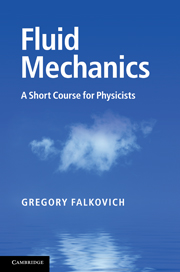Prologue
Published online by Cambridge University Press: 05 June 2012
Summary
The water's language was a wondrous one, some narrative on a recurrent subject …
A. Tarkovsky, translated by A. ShafarenkoThere are two protagonists in this story: inertia and friction. One meets them first in the mechanics of particles and solids where their interplay is not very complicated: inertia tries to keep the motion while friction tries to stop it. Going from a finite to an infinite number of degrees of freedom is always a game-changer. We will see in this book how an infinitesimal viscous friction makes fluid motion infinitely more complicated than inertia alone ever could. Without friction, most incompressible flows would stay potential, i.e. essentially trivial. At solid surfaces, friction produces vorticity, which is carried away by inertia and changes the flow in the bulk. Instabilities then bring about turbulence, and statistics emerges from dynamics. Vorticity penetrating the bulk makes life interesting in ideal fluids though in a way different from superfluids and superconductors.
On the other hand, compressibility makes even potential flows non-trivial as it allows inertia to develop a finite-time singularity (shock), which friction manages to stop. It is only in a wave motion that inertia is able to have an interesting life in the absence of friction, when it is instead partnered with medium anisotropy or inhomogeneity, which cause the dispersion of waves. The soliton is a happy child of that partnership.
- Type
- Chapter
- Information
- Fluid MechanicsA Short Course for Physicists, pp. xi - xiiPublisher: Cambridge University PressPrint publication year: 2011



